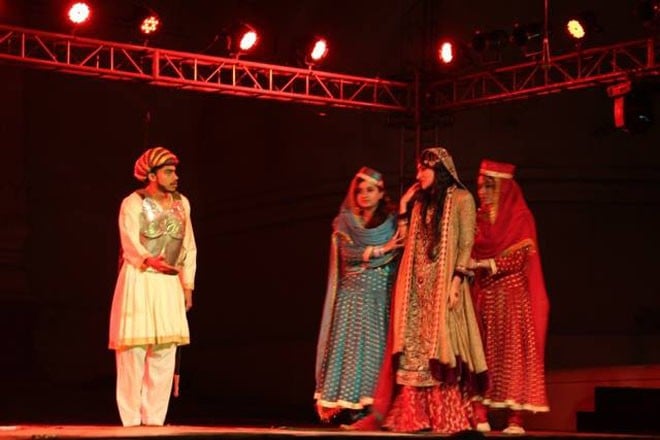
The theatre festival in Lahore was novel for its venue selection

The Lahore Walled City Authority took a praiseworthy step by organising a theatre festival at the Hazoori Bagh last week in which 10 groups participated. It was well-attended even on the evening when the Pakistan-India T20 match was keeping the people glued to the screens at home or in public spaces -- and driving them crazy at the same time.
Probably in olden times, when the city was not such a big sprawl and the community was more integrated, the cultural activity was very much a part of the social fabric of society. There were no dedicated spaces for the arts or cultural expression in the sense that there are now. For ordinary persons going to the theatre or music performance can be an intimidating act if held in a more formal environment. They are at ease with the freedom to walk in and walk out of a show and can explore the neighbourhood with total abandon.
It was perhaps to reclaim the same familiarity and comfort that the Lahore Walled City Authority decided to arrange a theatre festival in the historic Hazoori Bagh, a place which is as public as it gets. In Delhi, the area between the Lal Qila and Jama Masjid, known as Chandni Chowk, did become the centre of the capital. This area was only degraded and devalued by the construction of New Delhi. Similarly, in Lahore, Hazoori Bagh, the area between Badshahi Mosque and the Lahore Fort must have been a place to unwind and relax in pursuit of some cultural experience. And it was not so long ago that for many belonging to the oral tradition, the recitation of dastaans, qissas and kathas were a regular feature at the same Hazoori Bagh. Perhaps, the most distinguished among them were the Heer Khwans, who brought with them their distinct ang from the various parts of Punjab in the afternoon every weekend to an audience that initially was more connected and integrated to traditional culture than people are now.
The theatre groups and theatre groups of colleges that took part in the festival are well known for their thespian activity -- as they have been quite active on a number of fronts. Sufi Tabassum Society has been involved in holding plays and poetry recitals. Run by the family of Sufi Tabassum, the poet, critic, teacher and conversationalist par excellence, who contributed a lot to the culture of North India by his revitalised understanding of languages and poetry in Persian, Urdu and Punjabi. Aj Aakhaan Waris Shah Noo, written by Sufi Nisar, the son of Sufi Tabassum was about the contrast between the times of Waris Shah and the contemporary era. It has been performed many a time and very successfully over the past four decades, with always something fresh to offer on the changing values that find people on a very slippery slope, hoping for a firmer foothold.
The National College of Arts is quite active through its various societies and is a permanent fixture in the cultural scene of the city, if not the country. Their play Roshni too was appreciated for its directorial innovations. The main thrust of their performances usually leaves a visual footprint and it did not disappoint this time around too.
Shah by the Punjab University was a spoof on the larger than life characters and situations that have been characteristic of the monarchy in the past. By comparing and contrasting the larger than life gestures and attitudes to smaller mundane issues confronting ordinary people in recent times, it created humour aplenty in the production.
Gorakh Dhanda by the University of Management Technology too was about the various issues that younger people involve themselves with and then find an answer in abstract metaphysical terms. They were all the time preoccupied with the overwhelming question and paid little attention to resolving the issues of here and now.
The Allama Iqbal Open University’s presented Pyar Aik Khel Shahzadaon Ka, billed love or pyar as a luxury against the great issues that follow us all the time echoing the duality of gham-e-janaan and gham-e-dawraan. Sikhwa Jawabe Shikwa by the Forman Christian College was a good effort but rather one-dimensional as indeed was Tiger of Mysore by the Government College University. Adal Ki Zanjeer was staged by the Garrison University, while Do Duni Char was performed by the Azad Theatre, a group that has been quite active in the last few years.
There were no original plays in the festival, and they need not have been because every theatre festival does not mean that it has to stage new production. The novelty lay in the venue that was new for the groups and the participants. The most important aspect was that most were from educational institutions. They participated in larger numbers and the involvement of the younger people in cultural pursuits can always be seen as a positive sign.
The greater number of festivals catering to the youth has inspired many educational institutions to initiate theatre and other extra-curricular activity. Many of the plays performed were not done once but many a time in other festivals and forums. It was the comfort derived from the familiar that was of importance, primarily given the significance that it was held in a public venue, where audiences enjoyed the freedom of drifting in and out of a performance at will.